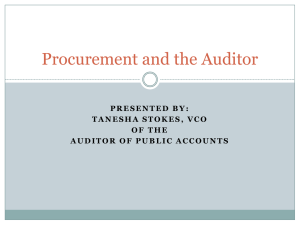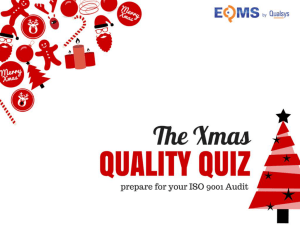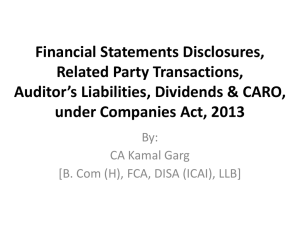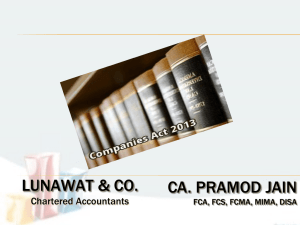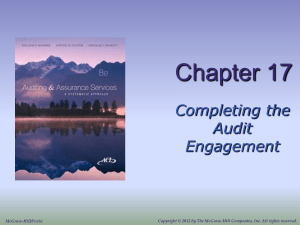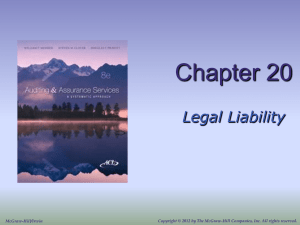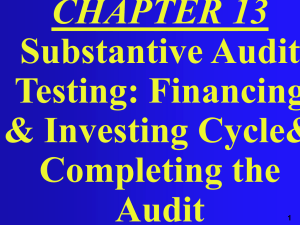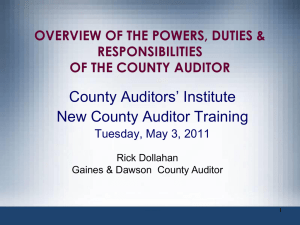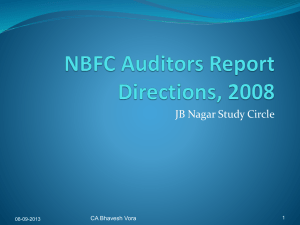1_134 - Baroda ICAI
advertisement
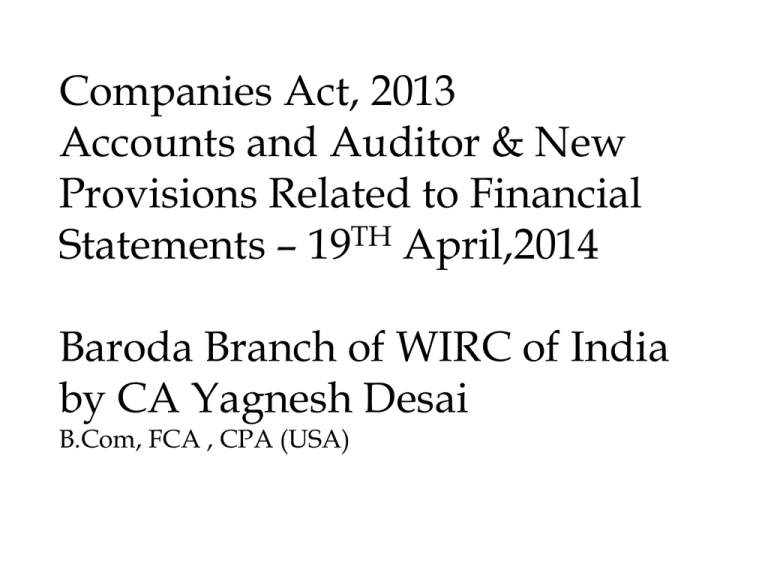
Companies Act, 2013 Accounts and Auditor & New Provisions Related to Financial Statements – 19TH April,2014 Baroda Branch of WIRC of India by CA Yagnesh Desai B.Com, FCA , CPA (USA) Financial Statements Sec 2(40): Financial Statements include: Balance sheet as at the end of Financial Year Profit & loss account or Income and Expenditure account Cash flow statement for the financial year Statement of changes in Equity, if applicable **** Any explanatory note annexed to or forming part of the above Financial Statements Give a True & Fair view Compliance with Accounting Standards (Sec.133) In the form Specified in Schedule III Not Applicable to • Insurance company • Banking company • Company engaged in generation or supply of electricity • Company governed by any other law for the time being in force Financial Year • A period ending on the 31st day of March every year • If the company is incorporated on or after 1st day of January of a year, the period ending on the 31st day of March of the following year • If the company is a holding or subsidiary of a company incorporated outside India, tribunal may allow them to follow a different financial year it is satisfied • Transitional period of three years . Cash Flow Statement • Mandatory for all companies except: – One Person Company, – Small Companies – Dormant Companies – The Act 1956 does not mandate the preparation and presentation of cash Flow Statement Requirement as per AS 3 Listed enterprises in India or abroad – ( Definition) A company which is in process of getting listed Banks including co-operative banks., Financial institutions Enterprises carrying on insurance business All commercial, industrial and business reporting enterprises whose :turnover for the immediately preceding accounting period on the basis audited financial statement exceeds Rs. 50 cr OR borrowings including public depositing excess of Rs. 10cr at any time during the accounting year Holding and subsidiary of any of the above during the accounting period. Books of Accounts in electronic mode Rule 3 of The Companies (Accounts) Rules, 2014 deals with books of accounts to be kept in electronic mode. - Records should be accessible in India & usable for subsequent purpose - the back-up of the books of account and other books and papers of the company maintained in electronic mode, including at a place outside India, if any, shall be kept in servers physically located in India on a periodic basis. Accounting Standards S 133 • Based on recommendation of ICAI and • In consultation and after recommendation made by NFRA , The Central Government may prescribe standards of accounting or any addendum there to. • Till any such standards are announced , The standards of accounting as specified under the Companies Act, 1956 (1 of 1956) shall be deemed to be the accounting standards Consolidations – Depreciation • Associates & Joint ventures are considered as “ subsidiaries ” for S 129(3) • Useful life concept for depreciation of tangible & Intangible assets in schedule II • Depreciating parts separately Reopening of accounts on Court’s or tribunal’s order. • Normally company is not permitted to reopen or re-cast its financial statements • Only on order of competent court or tribunal • On application made by • Income tax Authorities • SEBI • Any other authority • or any person concerned Voluntary revision of Financial Statements or Board Report • • After obtaining permission of the Tribunal on application made by the company. for any of the three preceding financial year • Such revised statement not more than one in a year. • It is not clear – immediate preceding or any three years ? • No such provision U/s 130. Auditors Particulars Section Rule Form No. Manner and procedure of selection of auditor 139(1) 3 4 Conditions for Appointment 139(1), Second to proviso 139(2) 5 Manner in which the companies to rotate their auditor 139(4) on the expiry of term 6 Removal of auditor before expiry of his term 140(1) 7 ADT-2 Resignation of auditor 140(2) 8 ADT-3 141(3)(d)(i) 10.1 141(3)(d)(ii) 10.2 Disqualification of auditor 141(3)(d)(iii) 10.3 141(3)(e) 10.4 Other matters to be included in Audit Report 143(2) 11 Duties and powers of the company’s auditor with reference to the audit of the branch and the branch auditor 143(8) 12 Reporting of frauds by auditor 143(12) 13 ADT-4 Manner and procedure of selection and appointment of auditors - • Audit Committee , if required to be constituted ,or else the board considers :• the qualifications and experience of the proposed individual or the firm are commensurate with the size and requirements of the company • Pendency of proceedings for professional misconduct • And call for other information as it may deem fit. Manner and procedure of selection and appointment of Auditors - • The Audit committee shall recommend the name of an individual or a firm as auditor to the Board and if the board agrees or If no such committee is required , or if the Board agrees ,the Board shall :• Consider and recommend to the member in annual general meeting for appointment Manner and procedure of selection and appointment of auditors • If the Board disagrees it cites the reasons for disagreement and refer back to Audit committee. • If Audit committee decides not to reconsider its original recommendation – the board records the reasons – send its own recommendation for consideration of members in annual general meeting • Auditor to hold office from the conclusion of that meeting till the conclusion of the sixth annual general meeting, with the meeting wherein such appointment has been made being counted as the first meeting: Appointment of Auditors Company to appoint auditor in the First AGM Auditor to continue from 2nd AGM through to 6th AGM The company shall place matter relating to such appointment for ratification by members at every general meeting * Auditor to issue: A Prior written consent to the appointment; and A certificate stating that he/she satisfies the criteria specified in Sec.141 and is qualified to be appointed as an Auditor * Company to intimate- ( as against the auditor) Registrar; and Auditor in less than 15 days of such appointment , earlier onus was on the Auditor. Certificate by Auditor Under Rule 4 “(1) The auditor appointed under rule 3 shall submit a certificate that (a) the individual or the firm, as the case may be, is eligible for appointment and is not disqualified for appointment under the Act, the Chartered Accountants Act, 1949 and the rules or regulations made thereunder; (b) the proposed appointment is as per the term provided under the Act; (c) the proposed appointment is within the limits laid down by or under the authority of the Act; (d) the list of proceedings against the auditor or audit firm or any partner of the audit firm pending with respect to professional matters of conduct, as disclosed in the certificate, is true and correct.” First Auditor -139(6) • First auditor of companies , other than Government Companies , shall be appointed by board within 30 days of incorporation, failing which , the members in EGM should appoint the auditor within 90 days of incorporation. • First auditor for Government companies , shall be appointed by CAG within 60 days, failing which the Board to appoint within next 30 days, failing which members at an EGM will appoint within 60 days. Casual Vacancy • The companies covered under audit and where the auditor is appointed by CAG, any casual vacancy will be filled by CAG within 30 days, failing which the Board will appoint in next 30 days. • For others the vacancy should be filled in by Board within 30 days , and in case of vacancy due to resignation it shall be approved by the company at a general meeting within 3 months of the recommendation by Board. • Where a company is required to constitute an Audit Committee under section 177, all appointments, including the filling of a casual vacancy of an auditor U/s. 139 shall be made after taking into account the recommendations of such committee. Rotation of the Auditor *Applicability • Listed companies • Unlisted public companies having paid up share capital of Rs. 10cr or more; • Private companies having paid up share capital of Rs. 20cr or more; • Any company having public borrowings from financial institutions, banks or public deposit of Rs. 50cr or more Rotation of the Auditor *- Not Applicable to Specifically a. One person company b. b. Small companies c. And also not applicable to ????????? Rotation of the Auditor * • Individual – One Term of 5 consecutive years; • Firm - Two terms of 5 consecutive years each; • The period for which the auditor has held office prior to commencement of this act shall be considered; • Transition period three years • Rotation of audit partners internally is possible as may be resolved by the members • In case of Joint auditor, company to ensure that all auditors DO NOT complete their terms in the same year. • Explanation II(a) to sub rule 3 of Rule 6 (a) a break in the term for a continuous period of five years shall be considered as fulfilling the requirement of rotation; Rotation of the Auditor * Associates – network firm auditor or audit firm under the same network of audit firms no eligible - the term “same network” includes the firms operating or functioning, hitherto or in future, under the same brand name, trade name or common control – explanation I to sub-rule 3 of rule 6. Audit term tagged to certifying partner The partner, who is in charge of an audit firm and also certifies the financial statements of the company, retires from the said firm and joins another firm of chartered accountants, such other firm shall also be ineligible to be appointed for a period of five years - explanation II (b) to sub-rule 3 of rule 6. Resignation & Removal of Auditor • Resignation The auditor resigning from the office (other than from government companies) is required to file a statement , containing reasons and facts, in a prescribed form within 30 days with the company and ROC , In case of government companies it has to be filed with CAG. • Removal Only on approval of central Government , pursuant to application made within 30 days of Board meeting made to Central Government. And after giving reasonable opportunity of being heard. Removal by passing Special Resolution in general meeting. Who is not Eligible for an appointment as an Auditor S 143(3) (a) a body corporate other than a limited liability partnership registered under the Limited Liability Partnership Act, 2008; (b) an officer or employee of the company; (c) a person who is a partner, or who is in the employment, of an officer or employee of the company; Who is not Eligible for an appointment as an Auditor (d) a person who, or his relative or partner— (i) is holding any security of or interest in the company or its subsidiary, or of its holding or associate company or a subsidiary of such holding company: Provided that the relative may hold security or interest in the company of face value not exceeding one thousand rupees or such sum as may be prescribed; - Rules 10 (1) Prescribed Rs. One lac (ii) is indebted to the company, or its subsidiary, or its holding or associate company or a subsidiary of such holding company, in excess of such amount as may be prescribed; or Rules 10 (2) Prescribed Rs. Five lac (iii) has given a guarantee or provided any security in connection with the indebtedness of any third person to the company, or its subsidiary, or its holding or associate company or a subsidiary of such holding company, for such amount as may be prescribed; Rules 10 (3) Prescribed Rs. Five lac Who is not Eligible for an appointment as an Auditor S 143(3) (e) a person or a firm who, whether directly or indirectly, has business relationship with the company, or its subsidiary, or its holding or associate company or subsidiary of such holding company or associate company of such nature as may be prescribed; (f) a person whose relative is a director or is in the employment of the company as a director or key managerial personnel; (g) a person who is in full time employment elsewhere or a person or a partner of a firm holding appointment as its auditor, if such persons or partner is at the date of such appointment or reappointment holding appointment as auditor of more than twenty companies; Who is not Eligible for an appointment as an Auditor S 143(3) (h) a person who has been convicted by a court of an offence involving fraud and a period of ten years has not elapsed from the date of such conviction; (i) any person whose subsidiary or associate company or any other form of entity, is engaged as on the date of appointment in consulting and specialised services as provided in section 144. S 143(4) Where a person appointed as an auditor of a company incurs any of the disqualifications mentioned in sub-section (3) after his appointment, he shall vacate his office as such auditor and such vacation shall be deemed to be a casual vacancy in the office of the auditor. Related Parties Associate Person His Relative His Partner Subsidiary Holding Subsidiar y Cap on No. of Audits S 141(3) (g) “a person who is in full time employment elsewhere or a person or a partner of a firm holding appointment as its auditor, if such persons or partner is at the date of such appointment or reappointment holding appointment as auditor of more than twenty companies” Includes OPC & small companies Companies (Amendment )Act 2000 private limited companies were not considered Representation made by ICAI vide letter dated April 15,2014 to Hon’ble Minister. Powers and Responsibilities To access books of the branch so far it relates to consolidation * To report cases of fraud to the Central government and to the Board / Audit committee * To Attend all the General meetings by himself or his representative who is qualified to an auditor * To comply with the Auditing Standards * To sign the audit report and certify any other documents of the company, Powers and Responsibilities • Whether revenue expenses have been charges to revenue expenses • Whether loans and advances made by the company has been shown as deposits • Whether loans and advances made by the company on the basis of security has been properly secured • Whether the terms on which they have been made are prejudicial to the interests of the company or it’s members Powers and Responsibilities • Whether the transactions of the company are prejudicial in the interest of the company • Investigation in case of company not being investment or banking company, whether shares debentures and other securities have been sold at a price not less than the purchase price * • Incase of government companies the CAG may conduct test audits if considers necessary * • Where the shares have been allotted in cash have been actually received Auditor’s Report – Major Concerns • Matters which have adverse effect on functioning of the company * • The branch auditor shall submit his report to the company’s auditor * • Whether the company has adequate internal financial controls in place and the operating effectiveness of such control * • Under SOX and as per AICPA opinion on operative effectiveness of control is covered in an exclusive and separate report and not covered in normal audit – (this is covered in Directors report too – confined to listed companies only) Audit Report – Views and Comments – S 143(3)(j) r. w Rule 11 • Whether the company has disclosed the impact, if any, of pending litigations on its financial position in its financial statement; • Whether the company has made provision as required under any law or accounting standard for material foreseeable losses if any on long term contracts including derivative contracts * • Whether there is any delay in transferring amounts required to be transferred to the Investor Education and Protection Fund * What are the services which are not to be rendered by Auditor? * • Accounting and book keeping services • Internal Audit • Design and implementation of any financial information system • Actuarial services • Investment advisory services • Investment banking services • Rendering of outsourced financial services • Management services • Any other as may be prescribed (not yet prescribed) Punishment for contravention * If any provision of Section 139, 143, 144 or 145 is contravened by the auditor then : • He shall be punishable with fine which shall not be less than Rs. 20,000 but may extend to Rs. 5 lacs If the auditor has done so intentionally then: • Imprisonment which may extend to 1 year with fine not less than Rs. 1 lac but may extend to Rs. 25 lac Punishment for contravention * In such cases the auditor has to : • Refund the remuneration received by him and • Pay the damages to the company arrived by the misleading audit statements made in his audit report In case of audit firms the partners will be jointly or severally liable as the case maybe End of Session
